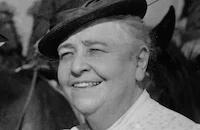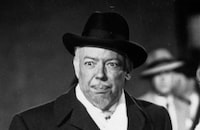Affair with a Stranger

Brief Synopsis
Cast & Crew
Roy Rowland
Jean Simmons
Victor Mature
Mary Jo Tarola
Monica Lewis
Jane Darwell
Film Details
Technical Specs

Synopsis
On the train to Philadelphia, actress Janet Boothe flirts with celebrated Broadway playwright Bill Blakeley, in whose latest show she is starring, but is gently rebuffed. Later, from his Philadelphia hotel, Bill calls his wife Carolyn and pleads with her to come up for his opening. When Carolyn makes excuses for why she cannot be there, Bill becomes angry and hangs up. He then runs into Janet in the hallway and makes a dinner date with her. Pleased, Janet calls gossip columnist Lucy Lawson at a television station and reports that the Blakeleys are getting divorced. Although she is unable to verify Janet's claim before airtime, Lucy nonetheless announces the Blakeleys' marital rift and writes about it in her newspaper column. Later, Pop, a New York newsstand operator, tells a curious customer about the first time he met Carolyn Parker years before, when Bill was a struggling writer: On New Year's Eve, in Times Square, Bill notices Carolyn as both are buying newspapers from Pop. After Pop informs Bill that Carolyn always buys a Toledo paper, Bill finds Carolyn among the noisy revelers and pretends to be an acquaintance from Toledo. When Bill boldly kisses her at the stroke of midnight, Carolyn becomes upset and pulls away. Bill apologizes and, while walking her to her apartment, admits his deception. Carolyn, in turn, reveals that the Toledo paper is for a neighbor and suggests he call her for a date. In the present, Pop concludes his story, and later, at Ma Stanton's restaurant, Ma, Carolyn's former landlady, tells her cashier about Bill and Carolyn's romance: At her apartment, Ma helps Carolyn, a fashion model from England, prepare for her first date with Bill. After the nervous Carolyn rips the back of her skirt and inadvertently exposes the tear to Bill, Ma rushes her into the bedroom. Bill then sneaks some food from Carolyn's kitchen and, once alone with her, makes annoying comments about her feminine decor. In retaliation, Carolyn boasts that she recently entertained a man named Timmy, and is chagrined when neighbor Mrs. Wallace comes to her door and asks her to baby-sit her young son, Timmy. Back in the present, the Blakeleys' old friends, Happy and Dolly Murray, discuss Lawson's column and recall the first time they all dined together: At the Murrays' apartment, Dolly, a fellow model, tells Carolyn in private that the jobless, broke Bill is not a good prospect. At first, Carolyn refuses to accept Dolly's assessment, but when she sees him join Happy's poker game, she has second thoughts. Angry at Bill for gambling, Carolyn resolves to break with him, but the next morning when she and Dolly run into him at an automat, she is unable to say no to a date. Back in the present, Happy, a reporter, is called to his office and takes his good friend Joe's cab to work. While driving, Joe remembers some of his encounters with the Blakeleys: Joe drives an elated Bill home after he has received his first $250 payment for writing. Bill presents Carolyn with the money and announces that his play will soon be mounted. The modest production is a flop, however, and in the back of Joe's cab, a despondent Bill informs Carolyn that he is quitting. Carolyn suggests that they form a "partnership" instead, and Bill accepts Carolyn's proposal with a kiss. Months later, Bill, tired of living off Carolyn's modeling wages, is just about to move out and look for a regular job when he receives a call from Venus Motion Pictures, offering to buy the screen rights to his play. When Carolyn returns home from work, she is surprised to find Bill sitting in the dark, surrounded by heaps of cash. Back in the present, Joe discharges Happy and heads for Ma's restaurant. There, Ma and nurse Miss Crutcher recall the time when Bill found out Carolyn was pregnant: After returning from the doctor's with Miss Crutcher, Carolyn breaks the news to Bill, who is ecstatic. Carolyn begins to calculate their future finances and is distraught when Bill confesses that he lost $1,400 gambling. They argue, and later, a guilt-ridden Bill takes a job as a waiter at a posh restaurant. One evening, Bill waits on Broadway producer George Craig and slips him a copy of his new play. Soon after, the play opens to rave reviews on Broadway. Carolyn is unable to attend the premiere, however, because she has gone into labor, two months before her due date. The baby dies and Carolyn, who can no longer bear children, is devastated. When Carolyn's depression persists, Bill decides to bring Timmy, whose mother has been hospitalized, to their Long Island home. Carolyn enjoys taking care of Timmy, and when Mrs. Wallace dies unexpectedly, the Blakeleys adopt him. In the present, Craig and his wife Helen discuss the Blakeleys' marital troubles, and Craig recalls the first time Bill worked with Janet: Just before an out-of-town opening, Bill receives a telegram from Carolyn telling him that she cannot make the premiere because Timmy has a toothache. Bill is disappointed, and later Janet, sensing his vulnerability, gives him a passionate kiss. In the present, Craig comments that Bill ended up casting Janet in all of his plays. Helen, who has had experience with homewrecking actresses, convinces Carolyn to grab a train to Philadelphia. Bill, meanwhile, is about to rendezvous with Janet when he reads Lawson's column. Panicked, he jumps on the next New York-bound train. Bill's train and Carolyn's train stop over at the same station, and the two spot each other. After reuniting, Bill swears that he has been faithful, while Carolyn cries with relief. The couple then head for the nearest hotel.

Director

Roy Rowland
Cast

Jean Simmons

Victor Mature
Mary Jo Tarola
Monica Lewis

Jane Darwell
Dabbs Greer
Wally Vernon

Nicholas Joy
Olive Carey
Victoria Horne

Lillian Bronson
George Cleveland
Billy Chapin
Louis Torres
Theodore Von Eltz
Mary Jane Carey
Dan Bernaducci
Frank Wilcox
Bob Hopkins
Bob Franklin
Walter Woolf King
Jack Lomas
Sam Mcdaniel
Chester Jones
James Adamson
Frank O'connor
Ben Bancroft
Phil Chambers
Art Millan
Bill Slack
Jack Wilson
Jack Chefe
Phyllis Godfrey
Dick Ryan
Stuart Nedd
Lillian Miles
Bob Jellison

Paul Maxey
Dick Coe
Fred Graham
Steve Flagg
Bruce Payne
Henny Backus
Chet Marshall
Robert Hudson
Aloy Moore
Eileen Howe
Ann Dore
John Indrisano
Nancy Duke
Joy Hallward
Peggy Leon
Nancy Moore
Mavis Russell
Bill Bailey
Richard Brandt
Franklin Farnum
Sammy Finn
Sandee Marriott
James Potter
Jeffrey Sayre
Carl Sklover
Lomax Study
Jack Hill
Paul Bradley
Al Cavens
Billy Vernon
Buck Young
Sue Carlton
Charmienne Harker
Sylvia Lewis
Josephine Parra
Jean Blackford
David Holt

Steve Rowland
Crew
George Amy
C. Bakaleinikoff
Mel Berns
Albert S. D'agostino
Harry D'arcy
Rene Dononcin
Bill Engvick
Richard Flournoy
Larry Germain
Feild Gray
John Grubb
Bob Harris
Bernard Kowalsky
James W. Lane
Jack Ledru
Lillian Orr
Clem Portman
Darrell Silvera
Robert Sparks
Clarence Steensen
Roy Webb
Harold E. Wellman
Harry J. Wild
Michael Woulfe

Film Details
Technical Specs

Articles
Affair With a Stranger
Since the mid-1940s, Jean Simmons had been acclaimed as one of Britain's most talented young actresses, thanks to her performances in such films as Great Expectations (1946), Black Narcissus (1947), and Hamlet (1948), for which she had been nominated for an Academy Award. She was under contract to the British J. Arthur Rank studio when she came to the U.S. with her new husband, Stewart Granger. Soon after, she found out that Rank had sold her contract, without informing her, to Howard Hughes, who then owned RKO. Simmons was obligated to Hughes for three films, but Hughes informed the actress that she needed to sign a seven-year contract with him, so he could build her up as a major star. Simmons refused, and there was much discussion and delay among Hughes, his underlings, Simmons' agent, and Simmons and Granger.
In the midst of all this, Simmons was offered the leading role in Roman Holiday (1953), a part she desperately longed to play. Hughes refused to loan her for the film. Unable to reach an agreement, Simmons finally sued Hughes, and won the right to do only the three films she owed Hughes, and the right to work for other studios during her RKO agreement. Hughes didn't make it easy for her. The first of the three films was Angel Face (1952). Although it gave Simmons a juicy role as a murderous sociopath, and had a terrific leading man, Robert Mitchum, the film was directed by Otto Preminger who was known for his often cruel and humiliating treatment of actors. While shooting a scene in which Mitchum slaps Simmons, Preminger insisted that Mitchum hit her for real, and not pull his punches. Still, the film was good, and fared well with the critics and at the box office. Affair with a Stranger was the second film, and fared less well, but also earned praise for Simmons' performance.
Before finishing her commitment to Hughes, Simmons made several well-received films for other studios, and by the time she was free, she was one of the most popular, and busiest actresses in Hollywood. And in spite of all the problems, she never spoke badly of Hughes, although her former husband, Granger, did - he wrote in his memoirs that Hughes propositioned Simmons, and threatened to ruin her career. But as recently as 1999, Simmons said, "All I know is that Howard Hughes was very kind to me...and he was a painfully shy man. He'd almost come into a room backwards, you know, he was so shy."
Producer: Robert Sparks
Director: Roy Rowland
Screenplay: Richard Flournoy
Art Direction: Albert D'Agostino, Feild M. Gray
Cinematography: Harry J. Wild
Costume Design: Michael Woulfe
Editor: George Amy
Music: Sam Coslow, Roy Webb
Cast: Jean Simmons (Carolyn Parker), Victor Mature (Bill Blakely), Mary Jo Tarola (Dolly Murray), Monica Lewis (Janet Boothe), Jane Darwell (Ma Stanton), Dabbs Greer (Happy Murray), Wally Vernon (Joe), Nicholas Joy (George Craig).
BW-87m. Closed captioning.
by Margarita Landazuri

Affair With a Stranger
Quotes
Trivia
Notes
The working titles of this film were Break-Up and Kiss and Run. An April 1945 Hollywood Reporter news item announced that Paramount had acquired Richard Flournoy's screenplay and assigned it to producer Paul Jones. No additional information about Paramount's involvement with the project has been found. RKO borrowed Victor Mature from Twentieth Century-Fox for the production. Hollywood Reporter news items list George Garver and Shirley Sandra as cast members, but their appearance in the final film has not been confirmed. Some scenes were shot at Paramount's New York street lot. Although a July 1952 Hollywood Reporter news item announced that Mary Jo Tarola, who played "Dolly" in the film, was changing her name to Linda Douglas, she was billed onscreen as Mary Jo Tarola. In the 1952 film Trail Guide, which was shot and released before Affair with a Stranger, Tarola was billed as Linda Douglas. Although a modern source states that Sam Coslow wrote the film's "title song," the only song performed in the picture was "Kiss and Run," which was not composed by Coslow.

Miscellaneous Notes
Released in United States 1953
Released in United States 1953














